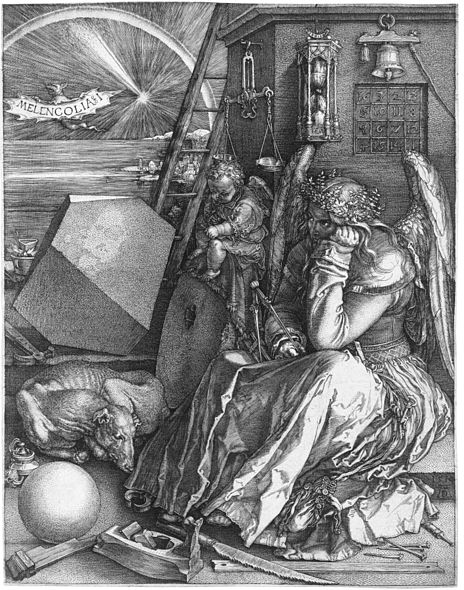
I want to bypass all the pseudo scientific bullshit associated with Dürer's Melancholy and say it from the beginning: this is clearly a self-portrait.
One can always argue that any painting is nothing more than a self portrait, so a few elements will be enough to make the case for: The face of the angel, the compass, the light, the sun clock, the hourglass, the bell, and the ladder.
The face is clearly Dürer's own travestied face. Maybe not so clear, but it is his face, bored face. Bored of working with the compass to make a stupid circle on a painting. If one looks closely, the radius of the compass is the same as the drawn sphere, so it is not just a self-portrait, but a self-portrait à la Velazquez, representing the act of painting the portrait.
The next three elements on the list define the context, the place where the action, or the non-action, is taking place: an atemporal place where the sun does not move so time does not pass. It is not a mistake that the sun clock does not have a shadow (in contrast to the hourglass which does), here the time does not pass, and furthermore we already run out of it, as can be seen in the hourglass. So, which place is it? Wittgenstein as usual can shed light on this: "If we take eternity to mean not infinite temporal duration but timelessness, then eternal life belongs to those who live in the present." The place represented in the painting is not a place but time itself. The present, as for Dürer.
The two remaining elements reveal the metaphor. The ladder going somewhere else, going outside, and the bell, which is ring from the outside (here we could also hear Wittgenstein again and his "death is not an event in life") by some one. But we know, il n'y a pas de hors-texte. There is no way out of this timeless time.
And we write, we do some science, build cities nobody ask us for, and even crucify our gods in order to try to get out of here. It is not the melancholy for a time to come, or a time already gone: melancholy is the essence of the timeless time, a time that we cannot get rid of.
Drawing by Dürer
No comments:
Post a Comment